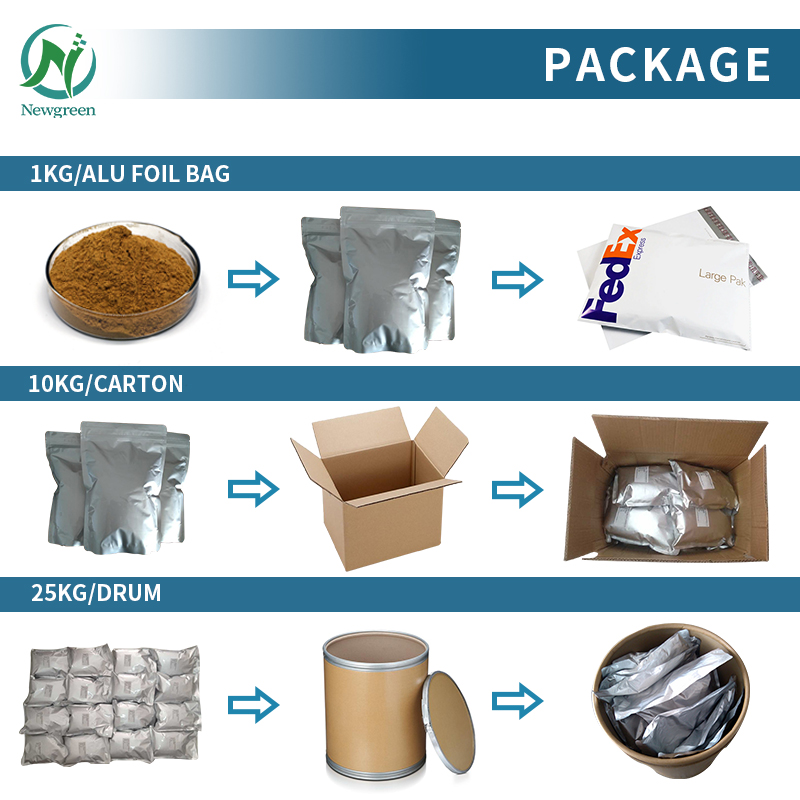High Quantity Vitamin B12 Supplements Top Quality Methylcobalamin Vitamin B12 Powder Price

Product Description
Vitamin B12, also known as cobalamin, is a water-soluble vitamin that belongs to the vitamin B complex. It plays important physiological functions in the body and is closely related to the formation of red blood cells, the health of the nervous system and the synthesis of DNA.
Recommended intake:
The recommended daily intake for adults is approximately 2.4 micrograms, and specific needs may vary based on individual differences.
Summarize:
Vitamin B12 plays an important role in maintaining good health and normal metabolism, and ensuring adequate cobalamin intake is critical to overall health. For vegetarians or vegans, supplements may be needed to meet needs.
COA
Certificate of Analysis
| Items | Specifications | Results | Methods | ||
| Appearance | From light red to brown powder | Complies | Visual method
|
||
| Assay(on dry sub.) Vitamin B12 (Cyanocobalamin) | 100%-130% of labelled assay | 1.02% | HPLC | ||
|
Loss on Drying(according to different carriers)
|
Carriers |
Starch
|
≤ 10.0% | / |
G B /T 6435 |
|
Mannitol |
≤ 5.0% |
0.1% |
|||
| Anhydrous Calcium hydrogen phosphate |
/ |
||||
| Calcium carbonate | / | ||||
| Lead | ≤ 0.5(mg/kg) | 0.09mg/kg | In house method | ||
| Arsenic | ≤ 1.5(mg/kg) | Complies | ChP 2015 <0822>
|
||
| Particle size | 0.25mm mesh all through | Complies | Standard mesh | ||
| Total plate count
|
≤ 1000cfu/g | <10cfu/g |
ChP 2015 <1105>
|
||
| Yeasts and Molds
|
≤ 100cfu/g | <10cfu/g | |||
| E.coli | Negative | Complies | ChP 2015 <1106>
|
||
| Conclusion
|
Conform to Enterprise standard
|
||||
Functions
Vitamin B12 (cobalamin) is a water-soluble vitamin that belongs to the vitamin B complex and mainly performs the following functions in the body:
1. erythropoiesis
- Vitamin B12 plays a key role in the formation of red blood cells, and deficiency may lead to anemia (megaloblastic anemia).
2. Nervous System Health
- Vitamin B12 is essential for the normal function of the nervous system, participating in the formation of nerve myelin, helping to protect nerve cells and prevent nerve damage.
3. DNA Synthesis
- Participate in DNA synthesis and repair to ensure normal cell division and growth.
4. Energy Metabolism
- Vitamin B12 plays a role in energy metabolism, helping to convert nutrients in food into energy.
5. Cardiovascular Health
- Vitamin B12 helps reduce homocysteine levels, which are associated with increased risk of cardiovascular disease.
6. Mental Health
- Vitamin B12 has a positive impact on mental health, and deficiency may lead to depression, anxiety and cognitive decline.
Summarize
Vitamin B12 plays an important role in red blood cell production, nervous system health, DNA synthesis, and energy metabolism. Ensuring adequate vitamin B12 intake is critical to maintaining overall health.
Application
Vitamin B12 (cobalamin) is widely used in many fields, including:
1. Nutritional Supplements
- Vitamin B12 is often used as a dietary supplement, especially suitable for vegetarians, the elderly and people with absorption disorders to help meet their daily nutritional needs.
2. Food fortification
- Vitamin B12 is added to certain foods to increase their nutritional value, commonly found in breakfast cereals, plant milks and nutritional yeast.
3. Drugs
- Vitamin B12 is used to treat deficiencies and is usually given in injectable or oral form to help improve anemia and neurological problems.
4. Animal Feed
- Add vitamin B12 to animal feed to promote the growth and health of animals and ensure their nutritional needs are met.
5. Cosmetics
- Because of its benefits for the skin, vitamin B12 is sometimes added to skin care products to help improve skin health and appearance.
6. Sports Nutrition
- In sports nutrition products, vitamin B12 aids in energy metabolism and supports athletic performance and recovery.
In short, vitamin B12 has important applications in many fields such as nutrition, food, medicine, and beauty, helping to improve health and quality of life.
Package & Delivery



















